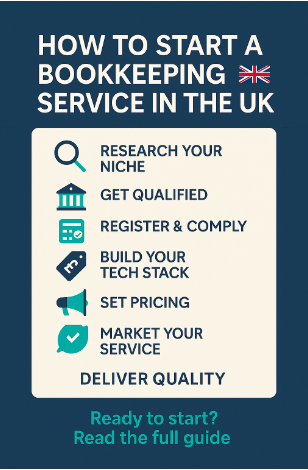Introduction
The UK’s 5.6 million-plus small businesses all need reliable bookkeeping, yet many struggle to find affordable, professional help. That gap creates a golden opportunity for anyone with a head for numbers and an eye for detail to start bookkeeping services of their own. Whether you’re leaving a finance role, returning to work after a career break, or turning a side-hustle into a full-time venture, this guide walks you through every stage, using UK spelling, taxation rules, and compliance requirements. By the end you’ll know exactly how to launch, position, and grow a bookkeeping business in the UK that ranks well in search and wins customers.
1. Hone Your Skills and Qualifications
Before you price your first client, make sure your technical skills are solid:
- Professional certifications, Although not legally mandatory, credentials from the Association of Accounting Technicians (AAT), Institute of Certified Bookkeepers (ICB), or Association of Chartered Certified Accountants (ACCA) boost credibility and help you command higher fees.
- Continuing Professional Development (CPD), The UK tax landscape evolves quickly (see Making Tax Digital, MTD). Schedule regular CPD to stay current and meet professional-body membership requirements.
- Soft skills, Accuracy is non-negotiable, but so are communication and time-management. Clients value bookkeepers who can explain figures in plain English and meet HMRC deadlines without panic.
SEO tip: Sprinkle related phrases such as qualified bookkeeper, AAT bookkeeping course, and bookkeeping skills into this section to signal expertise to search engines.
2. Decide on a Business Structure
Choosing the right legal vehicle affects everything from tax bills to admin workload:
| Structure | Pros | Cons |
| Sole trader | Simple setup; minimal paperwork; you keep all the profits. | Unlimited personal liability; income taxed via Self Assessment. |
| Limited company | Limited liability; potential tax efficiency via dividends; more professional image. | Annual accounts, Corporation Tax returns, and higher admin costs. |
| Partnership/LLP | Shared expertise and risk. | Joint liability (unless LLP) and possible disagreements on strategy. |
Most first-time founders begin as sole traders, then incorporate later for tax or brand reasons. Register your status with HMRC as soon as you start trading to avoid penalties.
3. Register and Stay Compliant
Bookkeeping businesses in the UK must follow strict anti-money-laundering (AML) rules:
- Register with a supervisory body, If you’re a member of AAT, ICB, or ACCA, they’ll supervise your AML compliance. Otherwise, register with HMRC’s Money Laundering Regulations (MLR) service.
- Apply for an AML check, Budget for the fee (£300+ in 2025).
- Get insured, Professional Indemnity Insurance (PII) is widely expected; £250k cover usually meets client tenders.
- Understand GDPR, Bookkeepers handle sensitive data. Publish a privacy policy and secure client records, paper and digital.
4. Build a Service Portfolio and Pricing Strategy
Successful firms go beyond “basic bookkeeping”:
- Core tasks: bank reconciliation, accounts payable/receivable, VAT return preparation, payroll, CIS submissions, and year-end trial balance.
- Add-ons & advisory: cash-flow forecasting, software training, and MTD onboarding. High-value services push your average revenue per client (ARPC) up.
- Pricing models:
- Fixed monthly packages (bronze, silver, gold) improve cash flow.
- Hourly rates suit ad-hoc projects, typical UK range £25-£45/hour for freelancers.
- Value-based fees reward efficiency; agree scope and deliver results rather than sell hours.
Write clear engagement letters outlining deliverables, deadlines, and late-payment penalties, both for professionalism and SEO (people often search “bookkeeper engagement letter template UK”).
5. Choose the Right Software Stack
Cloud platforms let you serve clients nationwide:
- Core bookkeeping, Xero, QuickBooks Online (QBO), and Sage Accounting dominate the UK market.
- Receipt capture, Dext Prepare or AutoEntry speed up data entry and impress clients.
- Payroll, BrightPay, Moneysoft, or the built-in modules of Xero/QBO.
- Practice management, AccountancyManager or Pixie for task tracking and AML record-keeping.
Most offer free partner programmes, becoming a Bronze Xero Partner or similar can boost your Google E-E-A-T signals (Experience, Expertise, Authority, Trust).
6. Create a Brand and Online Presence
Your website is both a shopfront and an SEO powerhouse:
- Pick a keyword-friendly domain, e.g., [YourTown]Bookkeeping.co.uk.
- Design for trust, Display certification badges, testimonials, and a professional headshot.
- Optimise on-page SEO:
- Title tag: “Bookkeeping Services | [Brand Name] | HMRC-Compliant UK Bookkeepers” (≤60 characters).
- H1: Mirrors the title but adds a location (“in Manchester” etc.).
- Meta description: clear benefit + call to action.
- Internal links: blog posts to service pages; service pages back to blog posts.
- Google Business Profile, Complete every field, enable messaging, and collect Google reviews (huge local SEO signal).
- Social proof, Active LinkedIn and Facebook pages index quickly and help prospects research you.
7. Market Your Bookkeeping Business
Combine digital and offline tactics:
- Content marketing, Publish fortnightly blog posts targeting long-tail keywords like “Is QuickBooks good for landlords UK?” or “VAT Flat Rate Scheme bookkeeping tips”.
- Networking, Join your local Chamber of Commerce or Federation of Small Businesses. Bookkeepers grow fastest via referrals.
- Paid ads, Google Ads with location modifiers (“bookkeeper near Glasgow”) convert well; cap daily spend while testing.
- Partnerships, Team up with accountants who don’t want small clients or virtual assistants who manage admin for sole traders.
- Email list, Offer a free “Year-End Checklist” PDF to capture leads (better than relying solely on social platforms you don’t own).
8. Set Up Processes and Maintain Quality
Once the leads roll in, scalability hinges on systems:
- Client onboarding, AML checks, engagement letter, direct-debit mandate, software setup. Automate with e-sign tools.
- Document request portals, Keep chasing to a minimum; clients drop files any time.
- Standard operating procedures (SOPs), Document every recurring task to maintain consistency if you hire staff or subcontractors.
- Key Performance Indicators (KPIs), Track monthly recurring revenue (MRR), churn rate, and average turnaround time.
- Cyber-security, Two-factor authentication (2FA) on all logins; backed-up, encrypted data. A single breach can sink your reputation overnight.
Conclusion
Starting bookkeeping services in the UK isn’t just about balancing ledgers; it’s about mastering compliance, branding, and client experience. By following the eight steps above, perfecting your skills, choosing the right structure, keeping HMRC happy, pricing smartly, embracing cloud software, building an SEO-friendly web presence, marketing strategically, and systemising delivery, you’ll create a resilient, scalable business that small firms can’t live without.
Ready to turn know, how into income? Download our free Bookkeeping Business Launch Checklist and begin ticking off each action today.


